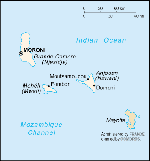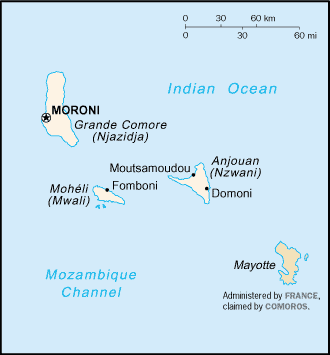 Comoros
Comoros
Country Specific Information
On this page » |
|
May 21, 2008
COUNTRY DESCRIPTION: 
 The Union of the Comoros is a developing nation located in the Indian Ocean off the east coast of Africa. Comoros consists
of three islands, Ngazidja (also known as Grand Comore), Moheli, and Anjouan, that cover about 900 square miles. A fourth
island, Mayotte, is claimed by Comoros but remains a territory of France. Ngazidja is home to the capital city, Moroni, and
is the most developed of the three islands. Facilities for tourism are limited and telecommunication links are unreliable.
French, Arabic, Swahili, and Comorian Creole are spoken. Read the Department of State Background Notes on the Union of Comoros for additional information.
The Union of the Comoros is a developing nation located in the Indian Ocean off the east coast of Africa. Comoros consists
of three islands, Ngazidja (also known as Grand Comore), Moheli, and Anjouan, that cover about 900 square miles. A fourth
island, Mayotte, is claimed by Comoros but remains a territory of France. Ngazidja is home to the capital city, Moroni, and
is the most developed of the three islands. Facilities for tourism are limited and telecommunication links are unreliable.
French, Arabic, Swahili, and Comorian Creole are spoken. Read the Department of State Background Notes on the Union of Comoros for additional information.
ENTRY/EXIT REQUIREMENTS: A passport and onward/return ticket are required. Visas are available from the Comoran Mission to the United Nations in
New York; American citizens visiting Comoros can obtain a free, 24-hour transit visa upon entry. The following day, visitors
are required to go to the immigration office in Moroni to change their visa status. A fee is charged, depending on length
of stay. Travelers should obtain the latest details from the Mission of the Union of Comoros, 420 East 50th Street, New York,
NY 10022; telephone number (212) 972-8010, fax (212) 983-4712.
Information about dual nationality or the prevention of international child abduction can be found on our web site. For further information about customs regulations, please read our Customs Information sheet.
Back to Top
SAFETY AND SECURITY: Comoros has experienced frequent strikes and civil unrest, resulting in violent clashes between police and demonstrators.
The most recent unrest involved the de facto separation of Anjouan from the Union government. In March 2008, Union forces
re-took Anjouan and are preparing the island for elections. The former leader of Anjouan, Mohamed Bacar, has applied for
asylum with France and is being held on the French Island of Reunion while his asylum claims is adjudicated. As the government
completes the transition to constitutional federalism and as Bacar’s asylum claim is pending, periodic strikes and protests
will likely continue to occur. U.S. citizens should avoid political rallies and street demonstrations as even demonstrations
intended to be peaceful can turn confrontational and possibly escalate into violence. American citizens are therefore urged
to avoid the areas of demonstrations if possible, and to exercise caution if within the vicinity of any demonstrations. Conditions
are subject to rapid change on each of the three islands of the Comoros due to weak political institutions and a lack of economic
development. In a rare, apparently religious-based attack, a clinic run by a foreign Christian organization was firebombed
on the island of Grande Comore in August 2007. Religious intolerance and religious-based violence remain very unusual in
Comoros.
Although foreign residents and visitors have not been targeted, the potential for further outbreaks of civil disorder remains
high, and Americans should exercise caution and good judgment, keep a low profile, and remain vigilant with regard to their
personal security. U.S. citizens are encouraged to register with the U.S. Embassy in Antananarivo, Madagascar, if visiting
or residing in Comoros. Embassy contact information is provided below.
For the latest security information, Americans traveling abroad should regularly monitor the Department’s web site, where
the current Travel Warnings and Public Announcements, including the Worldwide Caution, can be found.
Up-to-date information on safety and security can also be obtained by calling 1-888-407-4747 toll free in the U.S. and Canada,
or for callers outside the U.S. and Canada, a regular toll-line at 1-202-501-4444. These numbers are available from 8:00
a.m. to 8:00 p.m. Eastern Time, Monday through Friday (except U.S. federal holidays).
The Department of State urges American citizens to take responsibility for their own personal security while traveling overseas.
For general information about appropriate measures travelers can take to protect themselves in an overseas environment, see
the Department of State’s pamphlet A Safe Trip Abroad.
CRIME: U.S. travelers are advised to be vigilant against pick-pocketing and other forms of petty crime when visiting crowded market
areas, parks, and at the beaches. Violent crime is uncommon. The most commonly reported crime is breaking into homes.
INFORMATION FOR VICTIMS OF CRIME: The loss or theft abroad of a U.S. passport should be reported immediately to the local police and the nearest U.S. Embassy
or Consulate. If you are the victim of a crime while overseas, in addition to reporting to local police, please contact the
nearest U.S. Embassy or Consulate for assistance. The Embassy/Consulate staff can, for example, help you find appropriate
medical care, to contact family members or friends and explain how funds could be transferred. Although the investigation
and prosecution of the crime is solely the responsibility of local authorities, consular officers can help you to understand
the local criminal justice process and to find an attorney if needed.
See our information on Victims of Crime.
MEDICAL FACILITIES AND HEALTH INFORMATION: Medical facilities in Comoros are poorly equipped. Travelers should bring their own supplies of prescription drugs and
preventive medicines. Malaria is prevalent in Comoros. Travelers to Comoros should take malaria prophylaxis. The serious
and sometimes fatal strain of malaria, P. falciparum, is resistant to the anti-malarial drug chloroquine. Because travelers
to Comoros are at high risk for contracting malaria, the Center for Disease Control and Prevention (CDC) advises that travelers
should take one of the following antimalarial drugs: mefloquine (Lariam™), doxycycline, or atovaquone/proguanil (Malarone™).
The CDC has determined that a traveler who is on an appropriate antimalarial drug has a greatly reduced chance of contracting
the disease. In addition, other personal protective measures, such as the use of insect repellents, help to reduce malaria
risk. Travelers who become ill with a fever or flu-like illness while traveling in a malaria-risk area and up to one year
after returning home should seek prompt medical attention and tell the physician their travel history and what antimalarials
they have been taking. For additional information on malaria, protection from insect bites, and anitmalarial drugs, please
visit the CDC Travelers' Health web pages.
The East African Indian Ocean islands have seen a rise in the cases of chikungunya, a viral dengue-like ailment, and dengue
itself. As with malaria, chikungunya and dengue are transmitted by mosquitoes. Every effort should be made to use repellants,
proper clothing and barriers that discourage/prevent mosquito bites. The CDC web site contains further information on chikungunya
at http://www.cdc.gov/ncidod/dvbid/chikungunya/ and dengue at http://wwwn.cdc.gov/travel/yellowBookCh4-DengueFever.aspx.
There have been occurrences of measles in Comoros, with outbreaks of greater severity on the islands of Anjouan and Moheli.
Travelers are advised to ensure that their measles vaccinations are up to date.
Further, information on vaccinations and other health precautions, such as safe food and water precautions and insect bite
protection, may be obtained from the Centers for Disease Control and Prevention’s hotline for international travelers at 1-877-FYI-TRIP
(1-877-394-8747) or via the CDC’s web site at http://wwwn.cdc.gov/travel/default.aspx. For information about outbreaks of infectious diseases abroad consult the World Health Organization’s (WHO) web site at
http://www.who.int/en. Further health information for travelers is available at http://www.who.int/ith.
MEDICAL INSURANCE: The Department of State strongly urges Americans to consult with their medical insurance company prior to traveling abroad
to confirm whether their policy applies overseas and if it will cover emergency expenses such as a medical evacuation. Please
see our information on medical insurance overseas.
TRAFFIC SAFETY AND ROAD CONDITIONS: While in a foreign country, U.S. citizens may encounter road conditions that differ significantly from those in the United
States. The information below concerning Comoros is provided for general reference only, and may not be totally accurate
in a particular location or circumstance.
In Comoros, one drives on the right side of the street. Roads are ill-maintained, congested, very narrow and poorly lit at
night. Travelers should exercise extreme caution when driving after dark. Most urban roads are paved, but many rural roads
are not. Many roads are full of potholes and dangerous curves. Most roads have no posted speed limits, but road conditions
limit speeds to below 30 miles an hour. Drivers and front seat passengers are required to wear seat belts. There are no
laws regarding child safety seats.
There are no organizations in Comoros that provide emergency or roadside assistance. Individuals involved in accidents rely
on passersby for assistance. Taxis or a rental car with driver are preferable to public transportation. Please refer to
our Road Safety page for more information.
AVIATION SAFETY OVERSIGHT: As there is no direct commercial air service to the United States by carriers registered in Comoros, the U.S. Federal Aviation
Administration (FAA) has not assessed Comoros’ Civil Aviation Authority for compliance with International Civil Aviation Organization
(ICAO) aviation safety standards. For more information, travelers may visit the FAA’s web site at http://www.faa.gov/safety/programs_initiatives/oversight/iasa.
SPECIAL CIRCUMSTANCES: While religions other than Islam are permitted in Comoros, evangelization is illegal. Violators of this law can be fined
or imprisoned. Few establishments accept credit cards in the Comoros and most prefer Comoran Francs or Euros to dollars.
Please see our Customs Information.
CRIMINAL PENALTIES: While in a foreign country, a U.S. citizen is subject to that country's laws and regulations, which sometimes differ significantly
from those in the United States and may not afford the protections available to the individual under U.S. law. Penalties
for breaking the law can be more severe than in the United States for similar offenses. Persons violating the laws of Comoros,
even unknowingly, may be expelled, arrested, or imprisoned. Penalties for possession, use or trafficking in illegal drugs
in Comoros are strict, with convicted offenders receiving a mandatory minimum five-year jail sentence and heavy fines. Engaging
in sex with children or using or disseminating child pornography in a foreign country is a crime, prosecutable in the United
States.
Please see our information on Criminal Penalties.
CHILDREN'S ISSUES: For information see our Office of Children’s Issues web pages on intercountry adoption and international parental child abduction.
REGISTRATION / EMBASSY LOCATION: The United States has no Embassy in Comoros. Americans living or traveling in Comoros are encouraged to register with
the U.S. Embassy in Antananarivo, Madagascar through the State Department's travel registration web site, and to obtain updated
information on travel and security within Comoros. Americans without Internet access may register in person at the U.S. Embassy
in Antananarivo. By registering, American citizens make it easier for the Embassy to contact them in case of emergency. The
U.S. Embassy is located at 14-16 Rue Rainitovo, Antsahavola, Antananarivo. The mailing address is B.P. 620, Antsahavola,
Antananarivo, Madagascar; telephone [261] (20) 22-212-57; fax [261] (20) 22-345-39. The Embassy web site is http://www.usmission.mg/.
* * *
This replaces the Country Specific Information dated October 26, 2007 to update the section on Safety and Security.

